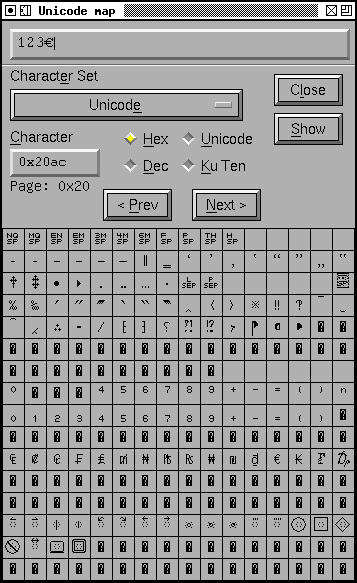A Unicode clipboard filler
 Umap -- places
unicode characters into the clipboard.
Umap -- places
unicode characters into the clipboard.
Few keyboards give access to even a small fraction of the Unicode character set. This little tool is designed to give you an extended keyboard showing all of Unicode (or various other standard encodings), and will place either a single unicode character or an entire unicode string into the clipboard.
Each time you click on the image of a character umap will place that character into the clipboard.
Clicking on a character will also place that character in the text field at the top of the window where you can build up strings of unicode characters and then select from that string and use ^C to place the your selection into the clipboard.
Finally, just selecting a string from the text field will place it in the
X PRIMARY selection, whence it may be pasted by clicking with
the middle mouse button.
You can use the "Character Set" pull down list to change what character set is displayed in the window. Character sets containing more than 256 characters will be broken into pages of 256 characters each, and you may move from one page to the next with the [<Prev] and [Next>] buttons.
You can type a hex or unicode value into the textfield labeled "Character"
after which pressing the [Show] button will display the page containing the
corresponding character.
Text is stored in the clipboard in the following formats:
The application into which you do your paste must be prepared to accept unicode in one of these formats.
There are two versions of this application. One is based on the gtk-2 widget set and iconv, and the other is dependent on some of the libraries used by fontforge.
The gtk based version is available as source tgz
The fontforge version is dependent on the libraries libgunicode and libgdraw which are currently only available from the FontForge website. You must download a FontForge release before you can install (or build) umap.
The build instructions are different for the two versions:
Make sure gtk is installed on your system, then download the umap-gtk package, and:
$ tar xf umap-gtk-src*.tgz $ cd umap $ make -f Makefile-gtk $ su # mkdir -p /usr/local/bin /usr/local/man/man1 # cp umap /usr/local/bin # cp umap.1 /usr/local/man/man1
To build umap you must first build the fontforge libraries:
$ tar xfz fontforge_full*.tgz $ tar xfz umap_src*.tgz $ cd fontforge $ configure $ make libs $ cd umap $ make $ su # echo First install umap, then install pfaedit's libraries # make install # cd .. # make install_libs
UMap-gtk has no special resources defined. It responds to the normal gtk resources.
UMap notices many of the resources described on the FontForge resource page. It also notices:
GDraw.InsChar.Family